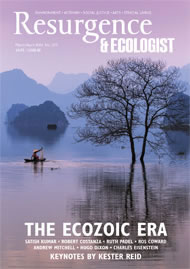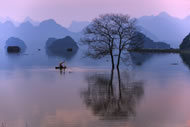The first principle of ethical and ecological living is to live in harmony with oneself, with the fellow members of the human family, and with all the species of the Earth community. Unfortunately, rather than living in harmony, the industrial societies have been busy controlling, dominating and reshaping the natural world to suit the industrial design and financial greed of modern civilisation. Now it is being proposed that we should name our age ‘the Anthropocene epoch’, meaning ‘the age of Man’.
The Nobel Laureate Paul Crutzen, who proposed this new name, has very good intentions. He believes that by highlighting human centrality and the impact of human activities upon the natural world we might wake up and do something to save the planet; we might develop a new sensibility for sustainability. However, many ecologists and environmentalists are worried about this proposal and are asking a fundamental question: by naming a geological epoch after ourselves are we not committing the ultimate act of human arrogance?
There is a reason for such questioning. Human hubris has been in evidence before – even when intentions may have been good. For example, the Whole Earth Catalog once proclaimed that we are “as gods and might as well get good at it”. And more recently, Mark Lynas named the human species “the god species”.
One way or another the industrial societies possessing powerful technologies have come to believe that they can and have conquered Nature. Now Nature must be managed, manipulated and even looked after – but only so that it can better serve the ever-increasing demands of industrial societies.
In this context even the well-intentioned idea of anthropocene could prove to be dangerous. Writing in the Spring 2013 issue of Earth Island Journal, Kathleen Dean Moore of Oregon State University says: “We should use words cautiously. Words are powerful, magical, impossible to control. With a single misguided phrase they can move a concept from one world into another, altering forever the landscape for our thinking.
“So no, not the ‘anthropocene’. That name completely muddles the message.
“Proud, solipsistic creatures that we are, we can convince ourselves that we are shaping Earth… The very notion that humans have become the shapers of Earth makes Earth guffaw in swirls of violence.”
In the same issue of the Journal, author Ginger Strand writes: “The idea of the anthropocene plays too slickly into the hands of the techno-utopians who will argue that since we are at the helm, we might as well put our hands on the rudder and steer. The very word ‘anthropocene’ makes too little accommodation for anything else besides us; it’s not going to help us live with more grace in a world full of things we can’t control, things we don’t know, things we might never know… What we don’t need is another word that feeds our idea of the all-powerful controllers we dream – or fear – we are.”
The late eco-theologian Thomas Berry proposed another name, which is much more humble and hopeful. He suggested that we name the coming epoch the Ecozoic. He urged humanity to repair the damage it has inflicted on the Earth and to bring about an era that is respectful of Nature, self-renewing and ecologically sustainable. He envisioned a new age in which humans and all other species live in harmony with each other. (Somehow Thomas Berry’s suggestion has not caught the attention of scientists and academics in the same way as Paul Crutzen’s.)
Once upon a time people believed in God; they believed that God would solve all their problems. Today we have a new god: the God of Technology. The industrial mindset has come to believe that we will find solutions to all our problems in technology, and somehow the name ‘anthropocene’ leads us towards that conviction, but in this issue of Resurgence & Ecologist Charles Eisenstein takes the view that technological fixes have severe limitations and that the problems created by technology cannot be solved by technology. He says we have to find other ways. Similarly other authors also highlight the need to reconnect with Nature and thus pave the way to the Ecozoic Era.
The choice is ours. Either we can embrace the suggested Anthropocene epoch, or create a new Ecozoic Era.







